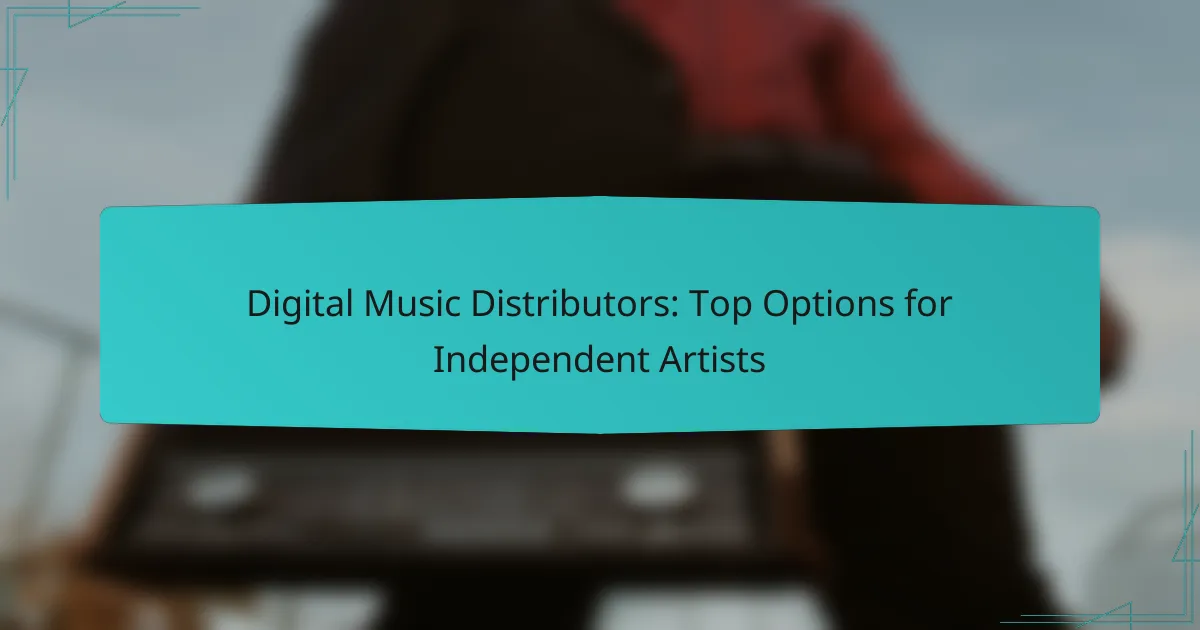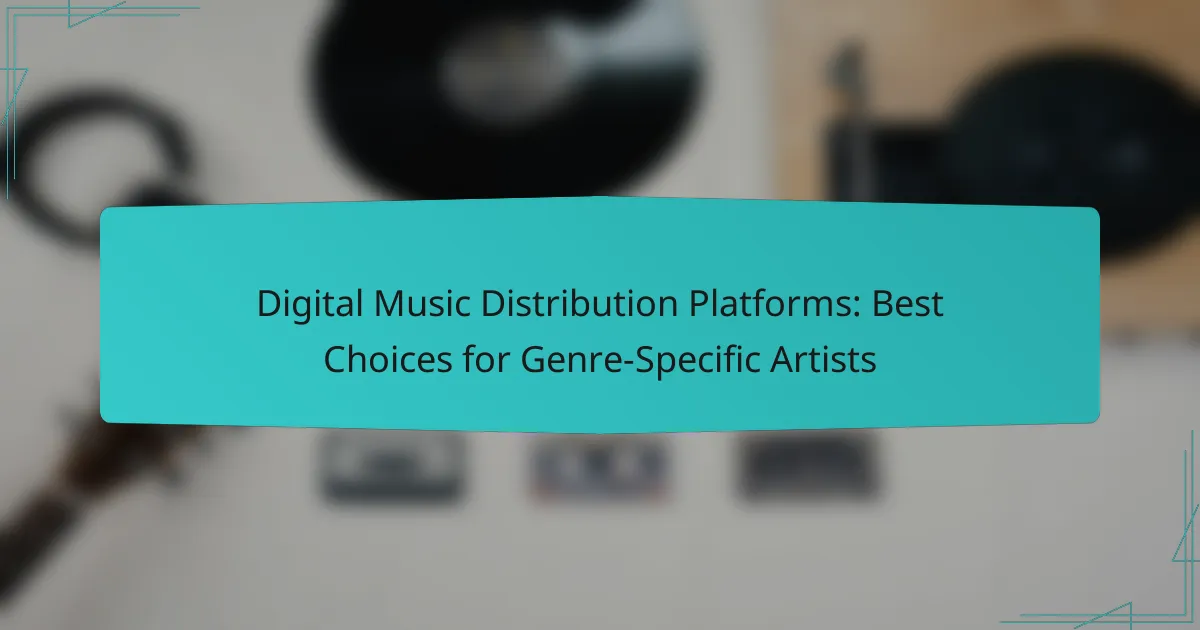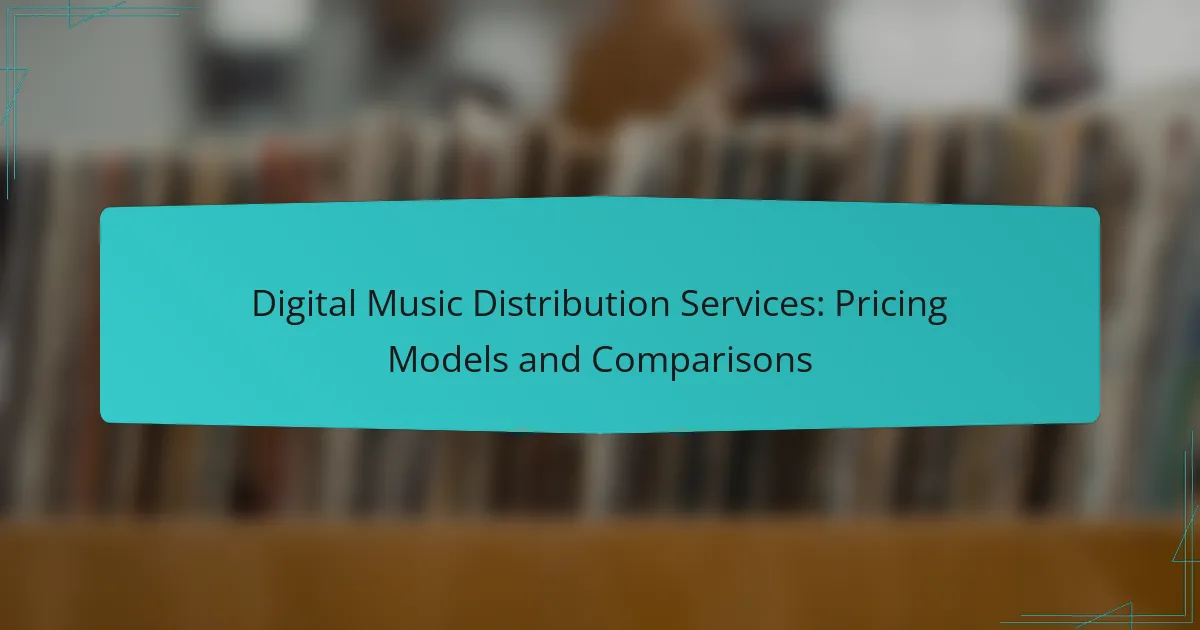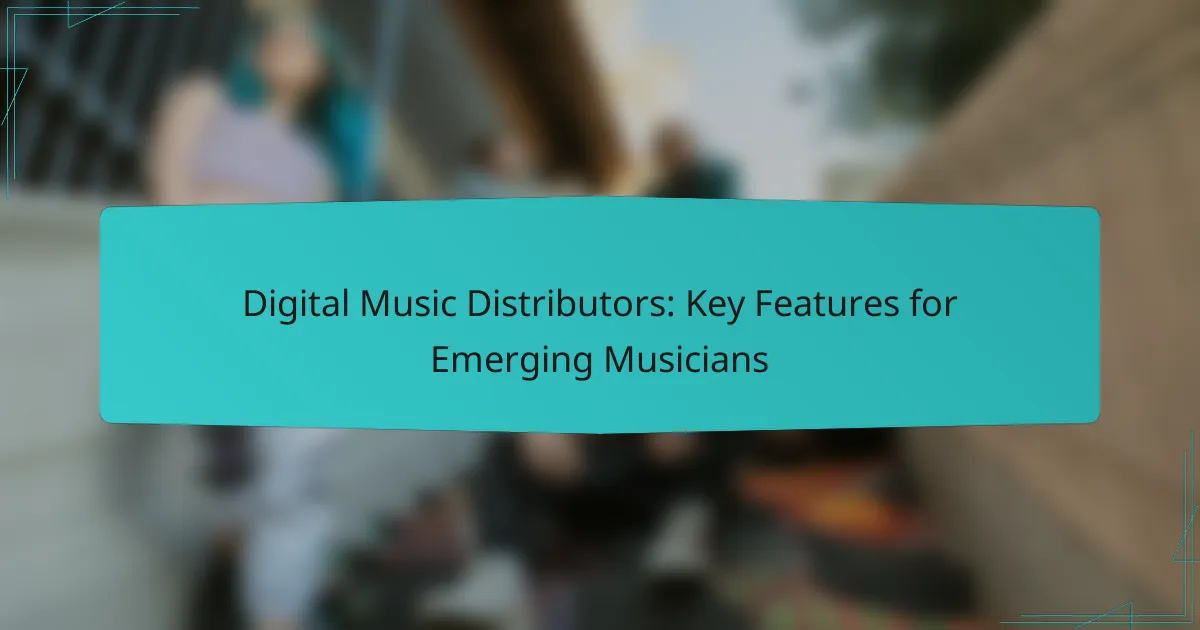For independent artists looking to share their music with the world, choosing the right digital music distributor is crucial. Platforms like CD Baby, TuneCore, Ditto Music, AWAL, and Soundrop offer various features and pricing structures to meet diverse needs. These distributors simplify the process of getting music onto streaming services while ensuring artists receive their due royalties.
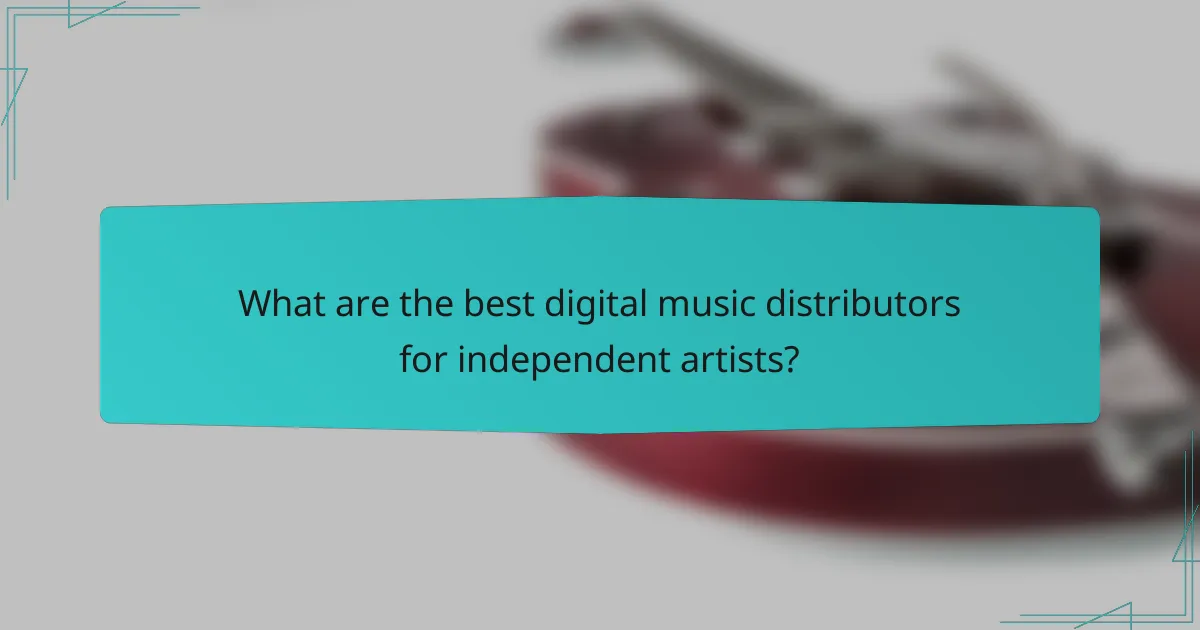
What are the best digital music distributors for independent artists?
The best digital music distributors for independent artists include platforms that facilitate music distribution across various streaming services while offering favorable terms. Key options like CD Baby, TuneCore, Ditto Music, AWAL, and Soundrop each have unique features that cater to different needs and budgets.
CD Baby
CD Baby is a popular choice for independent artists due to its straightforward pricing and comprehensive distribution network. Artists can choose between a one-time fee for single releases or an annual fee for unlimited releases, making it flexible for different budgets.
In addition to distribution, CD Baby offers services like music publishing and sync licensing, which can help artists earn additional revenue. However, they do take a percentage of sales, so artists should weigh this against their potential earnings.
TuneCore
TuneCore allows independent artists to distribute their music to major platforms like Spotify and Apple Music for an annual fee per release. This model can be advantageous for artists who plan to release multiple projects, as they can manage their catalog under one account.
One notable feature is TuneCore’s detailed sales reporting, which provides insights into where and how music is being consumed. However, artists should be aware that they keep 100% of their sales revenue, but the upfront costs can add up with multiple releases.
Ditto Music
Ditto Music offers a subscription model that allows artists to release unlimited music for a flat annual fee. This can be particularly beneficial for prolific artists who release multiple singles or albums throughout the year.
In addition to distribution, Ditto provides promotional tools and support for artists looking to grow their audience. They also offer a range of services, including music publishing and royalty collection, making it a well-rounded option for independent musicians.
AWAL
AWAL is known for its artist-friendly approach, providing distribution without upfront fees for selected artists. Instead, they take a percentage of sales, which can be appealing for those just starting out.
AWAL also offers additional services such as marketing support and access to data analytics, which can help artists make informed decisions about their careers. However, entry into AWAL is selective, so not all artists may qualify for their services.
Soundrop
Soundrop specializes in distributing cover songs and original music, making it a unique option for artists focusing on these genres. They charge a fee per release, which includes cover song licensing, simplifying the process for artists.
Soundrop also provides tools for collaboration and promotion, which can help independent artists reach wider audiences. However, artists should consider the costs associated with cover song licensing, as this can impact overall earnings.
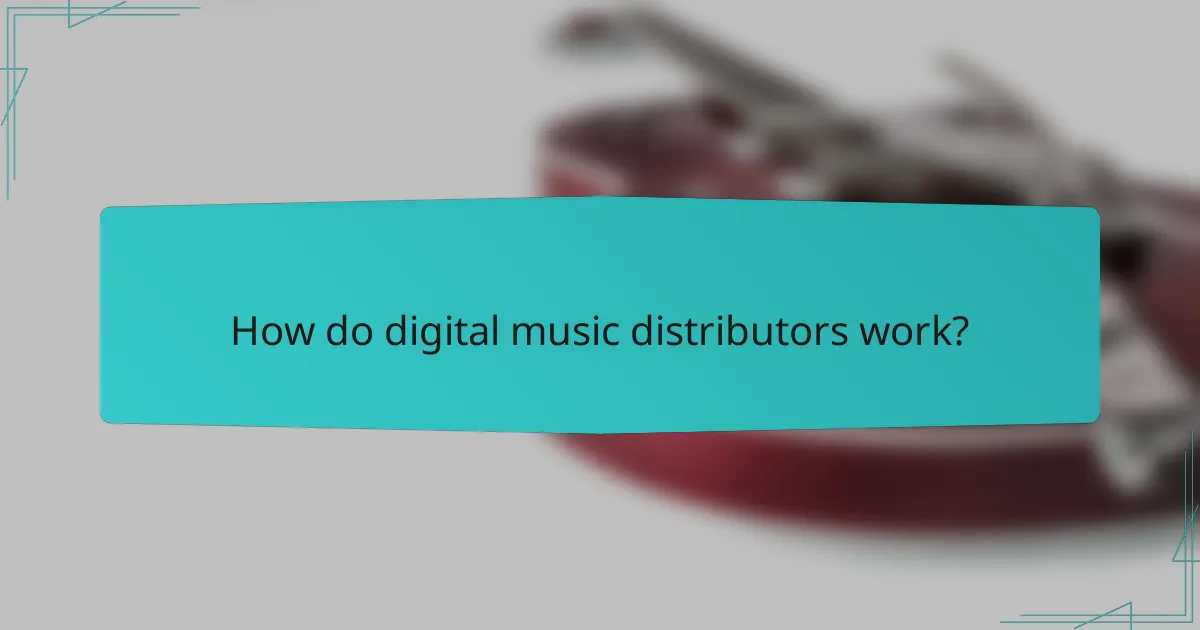
How do digital music distributors work?
Digital music distributors act as intermediaries between independent artists and online music platforms, facilitating the distribution of music to streaming services and digital stores. They handle the technical aspects of uploading tracks, managing metadata, and ensuring that artists receive royalties from their music sales and streams.
Distribution process overview
The distribution process typically begins with the artist signing up with a digital music distributor, providing their music files and necessary information. Once submitted, the distributor prepares the tracks for release by encoding them in the required formats and adding metadata, such as song titles and artist names.
After preparation, the distributor sends the music to various platforms like Spotify, Apple Music, and Amazon Music. This process can take anywhere from a few days to a couple of weeks, depending on the distributor and the platforms involved.
Revenue sharing models
Revenue sharing models vary among digital music distributors, but they generally fall into two categories: percentage-based and flat fee structures. In a percentage-based model, the distributor takes a cut of the revenue generated from sales and streams, often ranging from 10% to 30%.
Flat fee models charge artists a set fee for distribution, allowing them to keep all of their earnings. This can be beneficial for artists who expect high sales or streaming numbers. It’s crucial for artists to evaluate their expected revenue and choose a model that aligns with their financial goals.
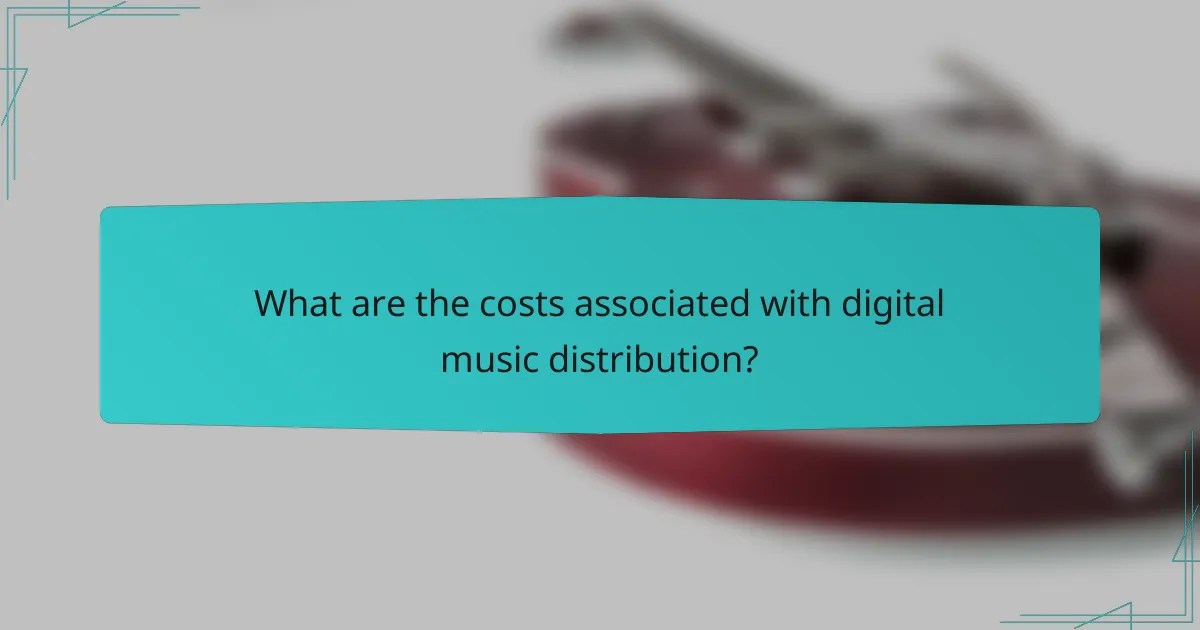
What are the costs associated with digital music distribution?
The costs of digital music distribution can vary significantly based on the distributor you choose and the services they offer. Key expenses typically include upfront fees, annual fees, and commission rates on sales, which can impact your overall earnings as an independent artist.
Upfront fees
Upfront fees are one-time charges that some digital music distributors require when you sign up or release your music. These fees can range from a nominal amount to several hundred dollars, depending on the distributor and the package you select. It’s essential to compare different platforms to find one that fits your budget and offers the services you need.
Some distributors may waive upfront fees in favor of higher commission rates, so consider your expected sales volume when evaluating options. Always read the fine print to understand what services are included in these fees.
Annual fees
Annual fees are recurring charges that some digital music distributors impose to maintain your music on their platforms. These fees can vary widely, typically ranging from around $10 to $50 per year. It’s crucial to factor these costs into your budget, especially if you plan to release multiple albums or singles over time.
Some distributors may offer a flat annual fee that covers unlimited releases, while others might charge per release. Assess your release strategy to determine which model is more cost-effective for you.
Commission rates
Commission rates are a percentage of your sales that digital music distributors take as their cut. These rates usually fall between 10% and 30%, depending on the distributor’s pricing structure. A lower commission rate means more revenue for you, but it may come with higher upfront or annual fees.
When choosing a distributor, consider how commission rates will affect your earnings. If you expect high sales volumes, a distributor with a lower commission rate may be more beneficial in the long run, even if their upfront fees are higher. Always calculate potential earnings based on your expected sales to make an informed decision.
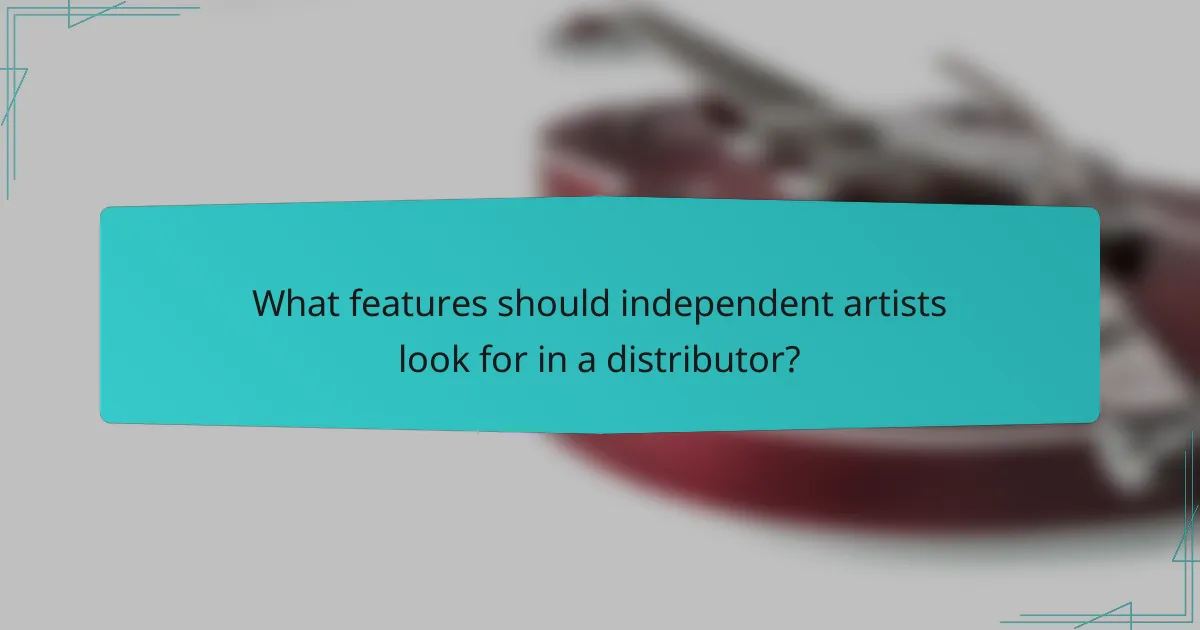
What features should independent artists look for in a distributor?
Independent artists should prioritize features that enhance their revenue potential and visibility. Key aspects include efficient royalty collection, a wide global reach, and effective marketing tools to promote their music.
Royalty collection
Efficient royalty collection is crucial for independent artists to ensure they receive fair compensation for their work. Look for distributors that offer transparent reporting and timely payments, ideally on a monthly basis. Some platforms may take a percentage of your earnings, so compare rates to find the most favorable terms.
Additionally, consider whether the distributor collects royalties from various sources, such as streaming services, digital downloads, and performance rights organizations. This comprehensive approach can significantly boost your overall income.
Global reach
A distributor with a broad global reach can help independent artists access international markets, increasing their audience and potential sales. Ensure the distributor partners with major streaming platforms and stores in various countries, allowing your music to be available worldwide.
Check if the distributor has localized services, such as support in different languages or tailored marketing strategies for specific regions. This can enhance your chances of success in diverse markets.
Marketing tools
Effective marketing tools are essential for promoting your music and engaging with fans. Look for distributors that provide built-in promotional features, such as social media integration, email marketing, and analytics to track your performance. These tools can help you refine your marketing strategies and reach a wider audience.
Some distributors also offer playlist pitching services, which can significantly increase your visibility on streaming platforms. Consider these additional services when choosing a distributor to maximize your promotional efforts.
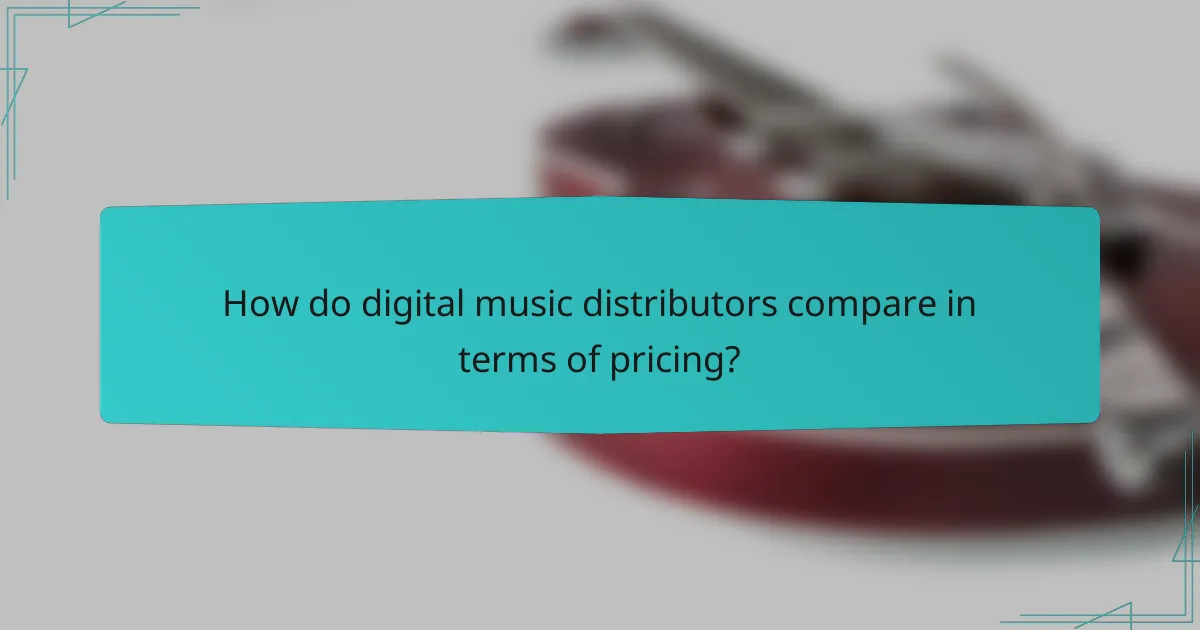
How do digital music distributors compare in terms of pricing?
Digital music distributors vary significantly in pricing structures, with some charging upfront fees while others take a percentage of sales. Independent artists should consider both the initial costs and ongoing fees to determine the most cost-effective option for their needs.
CD Baby vs. TuneCore
CD Baby typically charges a one-time fee for each album or single uploaded, which can range from around $9 to $49 depending on the format and services included. They take a percentage of sales, which is generally around 9% for digital distribution.
TuneCore, on the other hand, operates on an annual subscription model, charging about $10 to $50 per release each year. While they do not take a cut of sales, the annual fees can add up, especially for artists with multiple releases.
Ditto Music vs. AWAL
Ditto Music offers a flat fee model, charging around $19 to $49 per year for unlimited releases, making it appealing for artists planning to release multiple tracks. They retain about 10% of sales, which is relatively low compared to some competitors.
AWAL, however, operates on a more selective basis, often requiring an application process. They do not charge upfront fees but take a commission of around 15% on sales. This model may be more suitable for artists with established followings who can leverage AWAL’s promotional services.
